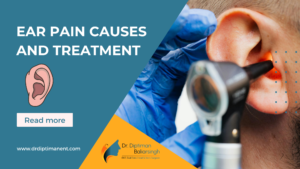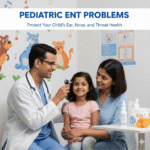
Common Causes of Ear Pain
Ear pain, also known as otalgia, can arise from a variety of underlying conditions, many of which are associated with infections or other medical issues. Among the most prevalent causes of ear pain are infections, such as otitis media, which is an infection of the middle ear, and otitis externa, commonly referred to as swimmer’s ear, which affects the outer ear canal. Symptoms of these infections often include sharp or throbbing pain, discharge from the ear, fever, and in some cases, difficulty hearing. It is essential to identify these signs early to prevent complications and ensure prompt treatment.
In addition to infections, ear pain can result from non-infectious causes. Barotrauma, for instance, occurs due to pressure changes in the ear, often experienced during air travel or scuba diving. Symptoms can range from dull discomfort to acute pain, depending on the severity of the barotrauma. Another significant source of ear pain can be referred pain from dental issues, such as abscessed teeth or temporomandibular joint (TMJ) disorders. This type of pain might manifest as a dull ache that can be mistaken for an ear problem.
Age can play a crucial role in the prevalence and presentation of ear pain. Children are more susceptible to ear infections due to their shorter Eustachian tubes and underdeveloped immune systems, whereas adults might experience ear pain linked to sinus infections or age-related changes in ear structure. Understanding the specific characteristics of ear pain, including whether it is sharp, dull, or throbbing, is crucial for effective diagnosis and treatment at facilities like Dr. Diptiman’s ENT Clinic in Cuttack, Odisha. Each cause of ear pain requires a tailored therapeutic approach to provide relief and restore normal ear function.
Diagnosis of Ear Disorders
The diagnosis of ear disorders at Dr. Diptiman’s ENT Clinic in Cuttack, Odisha, begins with a comprehensive evaluation of the patient’s medical history. This initial step allows the physician to gain insight into potential triggering factors, previous ear conditions, and the nature of the ear pain experienced. Patients are encouraged to articulate their symptoms in detail, including the duration, severity, and any associated conditions, such as hearing loss or balance problems. This information is crucial in directing further investigative procedures.
Following the history assessment, a physical examination is conducted to observe any visible signs of ear disorders. This examination typically involves the use of an otoscope, a specialized instrument that allows the doctor to view the ear canal and the eardrum. Through this examination, conditions such as ear infections, fluid accumulation, or abnormal growths can be identified. The otoscopic findings provide critical data, guiding the subsequent diagnostic steps necessary for a precise diagnosis.
In some cases, additional diagnostic tools, such as tympanograms, may be utilized to assess the functioning of the eardrum and middle ear. Tympanometry helps evaluate the mobility of the eardrum and can indicate problems such as fluid in the middle ear or Eustachian tube dysfunction. Depending on the findings from the initial examination and tympanometry, the physician may refer patients to other specialists, such as audiologists or allergy specialists, for more in-depth examinations.
Identifying the underlying cause of ear pain is essential for effective treatment. Proper diagnosis not only informs treatment plans but also enhances patient outcomes. Ensuring that each ear disorder is accurately diagnosed leads to targeted therapies, making the appointment at Dr. Diptiman’s ENT Clinic a vital step in addressing ear pain and related conditions.
Treatment Options for Ear Pain
Ear pain can arise from various underlying conditions, necessitating tailored treatment strategies at Dr. Diptiman’s ENT Clinic in Cuttack, Odisha. The clinic employs a comprehensive approach that encompasses both medical and surgical interventions to effectively manage this discomfort.
In cases where ear pain is related to infections, antibiotics are often prescribed to eradicate bacterial agents. It is essential for patients to adhere to the full course of medication to ensure complete resolution of the infection and to prevent recurrence. Pain management strategies are critical for patients suffering from acute ear pain. Over-the-counter pain relievers, such as ibuprofen or acetaminophen, are frequently recommended to alleviate symptoms. For certain patients, prescription medications may be necessary, particularly if the pain is severe.
Home remedies can also contribute to easing ear pain symptoms. Warm compresses applied to the affected ear may provide significant comfort and relief. Additionally, maintaining proper ear hygiene and avoiding irritants are vital steps in alleviating discomfort and preventing future issues. Patients are advised to avoid inserting objects into the ear canal, which can exacerbate pain and lead to complications.
For more severe cases where non-invasive treatments are ineffective, surgical options may be considered. Procedures such as tympanostomy (the insertion of tubes into the ear) or myringotomy (the surgical incision into the eardrum) may be employed to drain fluid and alleviate pressure. Furthermore, lifestyle changes, such as quitting smoking and managing allergies, can substantially reduce the likelihood of ear pain recurrence.
Through this multifaceted approach to treatment, patients at Dr. Diptiman’s ENT Clinic can expect to receive tailored care ensuring effective management and recovery from ear pain.
When to Seek Medical Help
Ear pain can be a distressing experience that may indicate underlying health issues. It is essential to recognize when it is appropriate to consult a medical professional, such as Dr. Diptiman at the ENT Clinic in Cuttack, Odisha. Persistent ear pain, especially when it lasts more than a few days, should not be ignored. This prolonged discomfort may signal an infection or other serious condition, warranting an evaluation by an ENT specialist.
Additionally, if individuals experience sudden or dramatic hearing loss associated with ear pain, it is crucial to seek immediate medical attention. Hearing loss can sometimes be a precursor to significant health concerns, and timely intervention may help preserve auditory function. Furthermore, the presence of other symptoms such as a high fever, which might indicate an infection, or drainage from the ear should prompt an urgent visit to a healthcare provider.
Many people hold misconceptions about ear pain, often believing it may resolve on its own without intervention. While some minor issues may do just that, deciding to ignore persistent pain can lead to further complications. It is vital to understand that in certain scenarios, such as when there is severe dizziness, balance issues, or if the pain follows a head trauma, it could be classified as a medical emergency.
Overall, the priority should be to maintain ear health and seek consultation when experiencing troubling symptoms. If any of the aforementioned signs occur, visiting Dr. Diptiman’s ENT Clinic is advisable. They can provide the appropriate care and treatment recommendations to address ear-related issues effectively.





